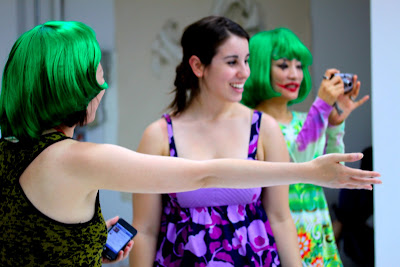 |
| Sunflower Seeds by Ai Wei Wei, commissioned by Tate Modern, 2010, the largest commission work by Tate in history; photo by Loz Pycock/Wikimedia Commons |
written by Wen Wen Lin, Feb. 14, 2012
.
Who's Afraid of Ai Wei Wei?
Ai Wei Wei -- 艾未未 (畏畏)-- Wei Wei, in Chinese, is homonym to "afraid, afraid", which is quite the opposite of what Ai stands for: as a political activist, spokesman for freedom of speech, the conscience of modern China, the artivist puts his art into action. With his un-ignorable attitude, he is anything but afraid to "stick his middle finger up" the Chinese Communist Party, as in one of his photography shows, or to shoot a bluntly open blasphemy, when he jumped in the air naked, holding a love pillow over his genital, "草泥马挡中央" (Fuck Your Mom, the Central Communist Committee)-- So who is afraid of Ai Wei Wei? Definitely not himself.
After been released by Chinese Authority, a nearly 3 month's psychological torture back in June 2011, this is the first time Ai Wei Wei been openly interviewed on-line, which is still a violation of his restriction for his parole, and soon we learned, after this interview, his wife was summoned by the Communist Party for interrogation for an entire day.
http://vimeo.com/35962600
 |
| Photograph: Fiona Hanson/PA |
In this video, with curator of his Stockholm exhibition, Tessa Praun, in Jan. 31, 2012, Ai talks about his work: Sun Flower Seeds-- a mess production that takes 1,600 faceless artisan workers for 2 yrs-- 6 tons of billions of hand-painted, fired porcelain sun flowers seeds: the concept of it moves the idealistic romantic side of me. The symbolic statement of this piece is very subtle: from the maximalism to the minimalism--the elegance of its simplicity in form, anonymous like sand, out of everyday life, and yet with complex social symbolism and connotations. It is his best, in my opinion-- it is art that matters-- every viewer can bring one seed back with them, and it brings interaction and social change. Even after coming out of the museum, the process of searching for meaning of the pc still lingers with the viewer. In its so exemplified the reduced minimal existence of the mess, exactly what i see in China from traveling extensively there every year for the past 15 yrs-- at the train stations, at the public square, and at the shopping malls, it is "People mountains, People seas", the mess existence-- I am both instantly drawn and aesthetically shocked by the grace of "Sun Flower Seeds"s simple form, but also for its magnitude and the multiplicity of maximalism, & symbolism. Still faceless, reduced to minimal form, & powerless contributors are those who really represent china, from ancient history, to cultural revolution (文化大革命1966 through 1976), to Tiananmen Square Protest (1989), to even nowadays revolution of Capitalism without democracy-- the powerless mess are still the powerless mess in face of tank, army and totalitarian regime, which shows only superficial sign of moderation in brutality when dealing with its own armless people, via influence of modernization and capitalism.
 | |
| at the Tiananmen Square, by Ai Wei Wei |
The Modern China: Communist Capitalism, and The disparity between capitalistic speedy material gains and spiritual/ cultural under-nourishment:
A startling example of a mid-size city transformation below would show how capitalism adds to enhance the Central Communist Party of its totalitarian power, and also show how in comparison, Western liberal democratic system is too "ideologically rigid", and costly with too many voices, too time consuming, and too dividing-- China is able to advanced in capitalism in such a speed, as seen from my own eyes, when traveling in the City of Quilin, and saw this mid-size city, completely torn down, and rebuild over mere 6 months period-- including relocation of all stores and the residents elsewhere, flatten the main streets-- the Broadway of the city, so to speak-- and the street was rebuild with modern neon, roads, and high rise in a few months period. Such a tremendous, dramatic facelift and change for a city, after the mayor of the city was offended by Bill Clinton's remark in his 1998 visit: "Guilin is like a beautiful innocent little girl shrouded in rags"-- will take hundreds of yrs for a democratic society to achieve; but it took Quilin 6 months. And this kind of transformation does not just happened in one city, it happens everywhere else in China over the past 30 yrs. The world's largest middle class is created, under communist capitalism. Even when the west was stripped naked financially by the string of financial crisis in 2008, followed Lehman Brothers' downfall, as Fukuyama observed, China was able to navigate itself, and turned the crisis into a way to "provide an engine for long-term domestic consumer demand." And all these was done based on the ability of its authoritarian political system to "make large, complex decisions quickly, and ... make them relatively well, at least in economic policy." (note 1) But China, as Ai Wei Wei observed, has not changed. If there is no freedom of speech, there is no growth in culture's spirit, and there is no change. What is created is this huge disparity between capitalistic gain and spiritual under-nourishment:
 |
| 草泥马挡中央; by Ai Wei Wei, photo from Ai's blog(shut down at the moment by the government) |
Ai Wei Wei's Role--The Future China and the Internet People's Revolution:
(1) Fukuyama: http://www.time.com/time/world/article/0,8599,2043235,00.html#ixzz1nLWps6HA)
(2) http://www.aiweiwei.com































